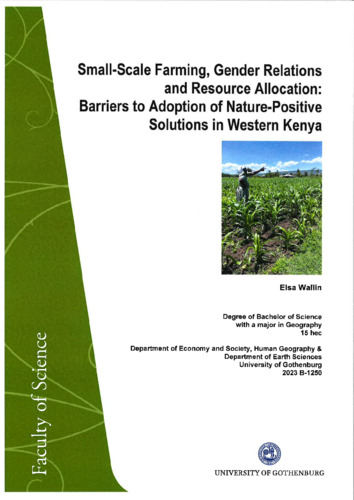Small-scale farming, gender relations and resource allocation: Barriers to adoption of nature-positive solutions in Western Kenya
The agricultural sector is a key driver of climate change and biodiversity loss and is in urgent
need for transition. NATURE+, a large-scale CGIAR agricultural development initiative, aims
to support small-holder farmers in shifting agrifood systems to more sustainable pathways by
adopting nature-positive solutions. With gender equality at its core, it is crucial to enhance
women’s opportunities and to identify any barriers to the adoption of nature-positive practices.
Yet, there is limited knowledge about mechanisms that reduce gender disparities in terms of
resource allocation and strengthen women’s empowerment, a knowledge gap that this study
aims to fill.
The aim of this study is to explore gendered experiences of empowerment and intra-household
allocation of resources in agriculture, and potential barriers to adoption of nature-positive
solutions among small-holder farmers within the NATURE+ initiative. A theoretical
framework of gender as a social construction, resources and empowerment is used to gain a
deeper understanding of the mechanisms in play. The data were collected using qualitative
methods and consist of 18 in-depth interviews with male and female farmers and village chiefs
in Nyakach, in western Kenya.
The findings reveal a strict patriarchal allocation of resources, creating a barrier to the adoption
of nature-positive practices with a disproportionate impact on women. This disparity was
particularly evident concerning financial and social resources, along with physical resources
such as land. Women were generally less empowered than men, but no clear generational
differences were observed. The participation of women in decision-making had increased over
time but was still limited by men’s traditional role as head of household and women’s
internalised lower value. The policy implication is that gender-specific measures are needed
for NATURE+ to be successful in supporting male and female farmers in the region.

